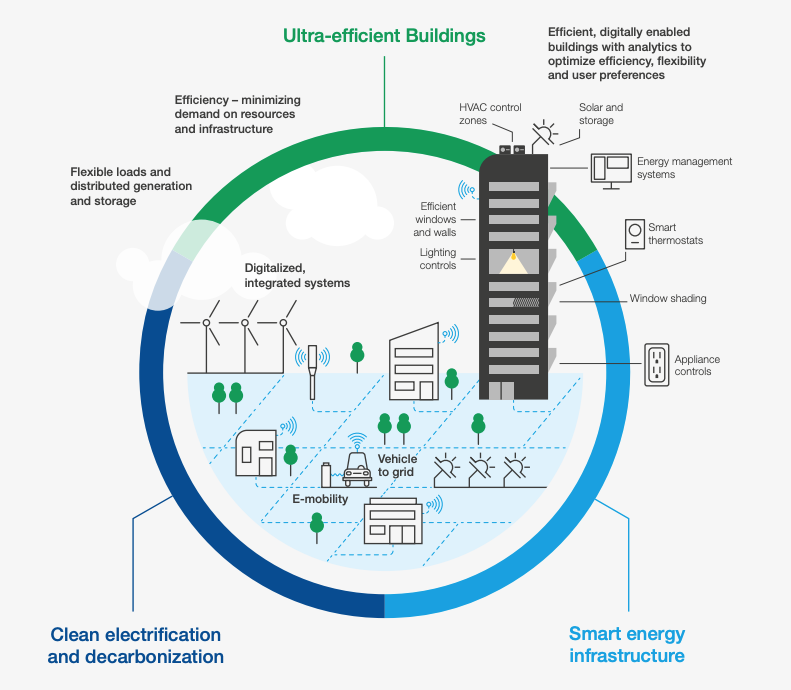Are net zero emissions by 2050 possible? Yes, says IEA

It's vital that we switch to renewable energy to meet net zero by 2050. Image: Unsplash/Anna Jiménez Calaf

Get involved with our crowdsourced digital platform to deliver impact at scale
Stay up to date:
Climate Crisis
Listen to the article
- The world can reach net zero emissions by 2050, but it will require some big changes, according to a new study.
- Our energy systems will need to be totally transformed, the International Energy Agency report Net Zero by 2050 says.
- Huge declines in the use of coal, oil and gas will be essential.
- These charts show what these changes could mean for the economy, citizens and governments.
Can the world really reach net zero emissions by 2050? Yes, says a new study – but we’ll need to make some big changes.
Climate pledges from governments so far will fall well short of what is needed, according to the International Energy Agency (IEA) report Net Zero by 2050: a Roadmap for the Global Energy Sector.
Ensuring we add no more CO2 emissions to the atmosphere than we remove is considered to be essential if we are to limit global warming to 1.5C above pre-industrial levels. Experts say doing this could reduce the chances of extreme heatwaves, droughts and floods by the end of the century. There are implications for food supplies, livelihoods and biodiversity across the world.
So how can we get to carbon neutrality? The IEA’s roadmap calls for a total transformation of the energy systems that underpin our economies. And it warns the gap between talk and action must close now.
These charts show what these monumental changes are likely to mean for the economy, citizens and governments.
Net-zero milestones
Many milestones will need to be reached along this path. If any sector lags behind, the report says, it could prove impossible to make up the difference elsewhere.
Some of those milestones need to be realized almost immediately. Getting to net zero carbon means huge declines in the use of coal, oil, and gas. As such, the IEA recommends that from 2021, no new unabated coal plants – which are plants with no abatement technology, such as carbon capture and storage – and no new oil and gas fields should be approved for development.
By 2050, almost 90% of the electricity produced globally will need to come from renewable sources – with 70% from solar and wind.
Supercharged investment

Of course, meeting these milestones will involve money – and lots of it. Investment in electricity, infrastructure and the end-use sectors – the energy directly consumed by the user – will need to ramp up substantially, the IEA says.
Over the next decade, the biggest increase will be needed in electricity generation, with annual investment shooting from about $0.5 trillion over the past five years to $1.6 trillion in 2030. By then, annual investment in renewables will have just topped the highest amount ever spent on fossil fuels to reach $1.3 trillion. At the same time, global investment in fossil fuels will need to fall steadily.
Continued spending on electric vehicles, clean energy infrastructure, transforming industrial processes and more efficient buildings will also be essential.
Behavioural changes

For citizens, this will mean quickly getting used to new ways of doing things. But the report says COVID-19 has increased general awareness of how behavioural changes can be effective (think home-working and mask-wearing), and this effort will play an important role in the world reaching net zero by 2050.
What is the Forum doing to help cities to reach a net-zero carbon future?
While it is citizens and companies that will need to modify their behaviour, though, changes will be driven by government investment and policy, and in some cases new laws.
Around 75% of the emissions saved by behavioural changes between 2020 and 2050 could be directly influenced by government policy, including measures such as phasing out polluting cars and reducing speed limits on motorways.
Driving innovation

Even if all of this is achieved, there is another piece of the puzzle: innovation. According to the report, without a major acceleration in clean energy innovation, getting to net zero by 2050 will not be possible.
In fact, the technologies on the market today will provide nearly all of the emissions reductions needed by 2030 to put the world on track for the 2050 goal. But after that, getting to net zero carbon will require widespread use of technologies still in development today. In 2050, almost half of CO2 emission reductions will need to come from technologies that are currently prototypes or being demonstrated.
As such, major innovation efforts will be needed in the current decade to get these technologies – such as carbon capture, utilization and storage in cement production or ammonia fuels for shipping – ready.
Don't miss any update on this topic
Create a free account and access your personalized content collection with our latest publications and analyses.
License and Republishing
World Economic Forum articles may be republished in accordance with the Creative Commons Attribution-NonCommercial-NoDerivatives 4.0 International Public License, and in accordance with our Terms of Use.
The views expressed in this article are those of the author alone and not the World Economic Forum.
The Agenda Weekly
A weekly update of the most important issues driving the global agenda
You can unsubscribe at any time using the link in our emails. For more details, review our privacy policy.
More on Climate CrisisSee all
Mette Asmussen and Takahiro Furusaki
April 18, 2024
Laia Barbarà and Ameya Hadap
April 17, 2024
John Letzing
April 17, 2024
William Austin
April 17, 2024
Rebecca Geldard
April 17, 2024








